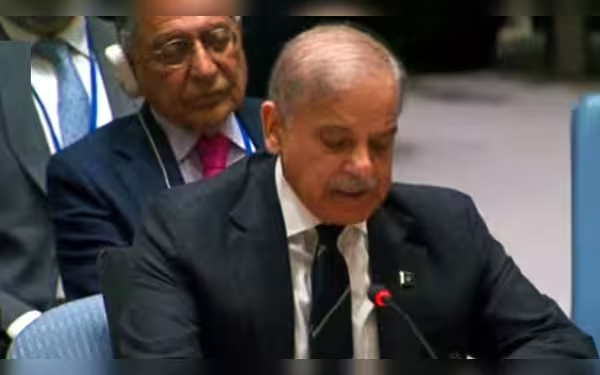Saturday, November 16, 2024 05:43 PM
Pakistan Calls for UNSC Sanctions Against Israel
- PM Shehbaz urges UNSC to impose sanctions on Israel.
- Calls for arms embargo to halt violence in Gaza.
- Stresses need for accountability regarding Kashmir issue.
 Image Credits: geo
Image Credits: geoPM Shehbaz Sharif urges UNSC to impose sanctions on Israel for violence against Palestinians during UN General Assembly address.
In a significant move on the international stage, Prime Minister Shehbaz Sharif of Pakistan has called upon the United Nations Security Council (UNSC) to impose sanctions against Israel. This appeal comes in light of what he describes as "genocidal acts against the Palestinians." The Prime Minister made these remarks during a high-level debate at the 79th United Nations General Assembly, emphasizing the urgent need for action to address the ongoing violence in Gaza and the broader Middle East.
During his address, PM Shehbaz highlighted the necessity of an arms and trade embargo against Israel, stating, "We must compel Israel to halt its genocidal war in Gaza and prevent its attempts to provoke a wider conflict in the Middle East." His strong condemnation of Israel's military actions extended to its recent bombings in Lebanon, where he insisted that accountability for such actions is long overdue.
Furthermore, the Prime Minister urged the UNSC to develop an impartial plan aimed at achieving a ceasefire and a peaceful resolution to the ongoing war in Ukraine. He pointed out that the proliferation of conflicts across the globe, particularly in the Middle East and Europe, coupled with rising poverty, poses a significant threat to global stability. "Last Sunday we approved the pact for the future. We must give life to our commitments; otherwise, the future will be bleak and dangerous," he warned.
Addressing the Kashmir issue, PM Shehbaz stressed that the UNSC can no longer overlook the Jammu and Kashmir dispute, which he believes is a major threat to international peace and security. He called for an end to the "massive violations of the fundamental rights of Kashmiri people" and urged the council to implement its own resolutions that advocate for a plebiscite in the region.
In addition to these pressing issues, the Prime Minister also raised concerns about the resurgence of terrorism, particularly from Afghanistan, citing groups like Daesh and "Fitna al-Khawaraij." He emphasized the need for the UNSC to support African nations and the African Union in their fight against terrorism and foreign interventions. He stated, "UN peacekeeping must become more robust and effective," highlighting the importance of a strong international response to these challenges.
Moreover, PM Shehbaz called for the UNSC to take decisive action to prevent conflicts between major powers and to ease rising tensions, especially in Asia. He advocated for a zero-tolerance policy regarding the illegal use of force and urged the revival of global efforts to halt the new arms race in both nuclear and conventional weapons. He also pointed out the need for control over emerging technologies, including Artificial Intelligence, which he believes could make warfare more likely and deadly.
As Pakistan prepares to assume its seat in the UNSC next year, PM Shehbaz has expressed his commitment to pursuing these objectives in collaboration with other member states. His call for action reflects a broader desire for peace and stability in a world increasingly fraught with conflict. The Prime Minister's statements serve as a reminder of the critical role that international cooperation plays in addressing global challenges, and the importance of holding nations accountable for their actions. In a time when the world seems more divided than ever, the call for unity and peace is not just timely; it is essential for a safer future for all.













